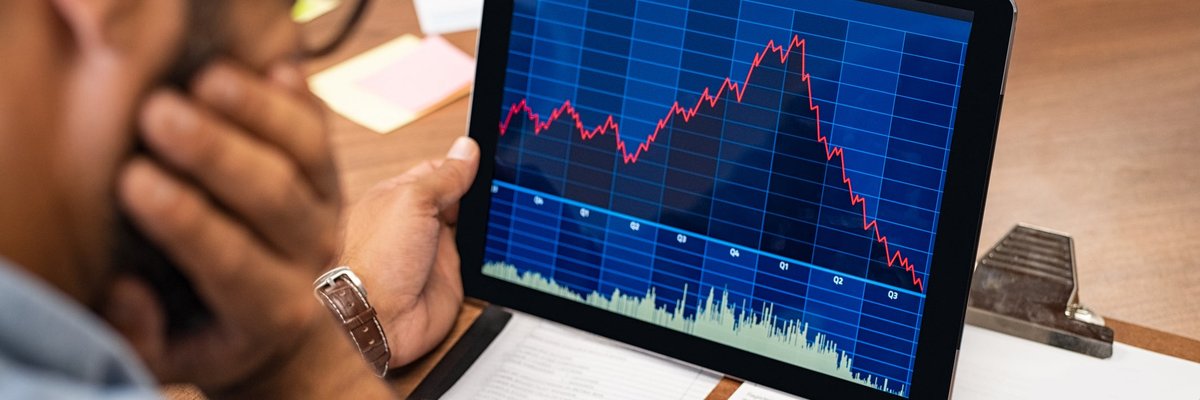Here's Why the Most Recent Drop in Portfolio Value Feels So Dramatic
KEY POINTS
- Several years of bad news changes the way we look at everything.
- Throughout history, every bear market has been followed by a bull market.
- Gathering credible evidence can help quell investment anxiety.
When it rains, it pours.
The market rises, and the market falls. Most experienced investors have learned that there's a rhythm to the stock market. Falling apart every time stocks take a tumble is not constructive.
Still, the most recent drop feels different, bigger somehow. Although the evidence tells another story entirely, it's easy to buy into the notion that what we're currently experiencing is the most dramatic loss in portfolio value ever.
There may be a few reasons so many people have declared that the sky is falling.
Primed to take more bad news hard
There's been nothing typical about the past three years. It was three years ago that we learned of COVID-19, the first pandemic in most of our lives. And then a recession hit. While that recession did not last long, it did more than its fair share of damage.
There was a global supply chain crisis and surge in inflation. During that time, Russia invaded Ukraine and the stock market shuddered, then began to decline. By the time 2023 rolled around, the S&P 500 Index and Nasdaq Composite had both dropped dramatically.
Those who could, sheltered in place, worked from home, and took on the task of educating their children. Soon, cracks in our emotional armor began to emerge.
According to Time, the number of Americans who sought treatment for mental health disorders rose from 19.2% in 2019 to 21.6% in 2021. The National Library of Medicine reports an increase in the number of people who began taking antidepressants during this time. And the World Health Organization (WHO) says that COVID-19 "sparked or amplified much more serious mental health problems."
In short, we experienced a global trauma together. Perhaps it's natural that the straw that broke the camel's back was learning that the average 401(k) balance had plunged by 23%.
Month after month we had endured a difficult situation, and by the time it became clear how much less our portfolios were worth, some people who regularly invest in the market took the news harder than is warranted.
We can't get away
There was a time when we could escape whatever was going on outside the four walls of home. Today, we are battered with news, rumors, opinion, and conspiracy. It's all over social media, on television, radio, podcasts, and real life. The constant drumming of doom and gloom makes it difficult to get away and to see things from a different vantage point.
Reality gets buried
There's a difference between being a Pollyanna and being someone who gathers enough information to make a rational decision. And here's the reality, according to comprehensive research conducted by Hartford Funds:
- To be called a "bear market," the S&P 500 Index must drop by 20% or more. By the end of 2022, the S&P 500 Index had dropped by 19.4%.
- If a person spends 50 years of their lives investing, they can expect to live through 14 bear markets.
- Between 1929 and 2021, there were 26 bear markets and 27 bull markets.
- On average, stocks lose 36% of their value during a bear market. But on average, stocks gain 114% during a bull market.
- The average bear market lasts 289 days, while the average bull market lasts 991 days.
Emotion skews our perception
A report in Swiss Medical Weekly says that emotion determines how we perceive the world and how we make important decisions. Given the constant bombardment of bad news over the past few years, it comes as no surprise that emotions are frayed, or that it's become more difficult to look past scary financial news to find a silver lining.
Throughout the history of the stock market, three things have always been true:
- Every bear market has been temporary.
- Staying invested while stock values are low is a smart investment strategy for buy-and-hold investors.
- Every bear market is followed by a bull market.
Even if shrinking portfolio values feel worse today than they have in the past, it may just be a matter of perception.
Our Research Expert
We're firm believers in the Golden Rule, which is why editorial opinions are ours alone and have not been previously reviewed, approved, or endorsed by included advertisers. Motley Fool Money does not cover all offers on the market. Motley Fool Money is 100% owned and operated by The Motley Fool. Our knowledgeable team of personal finance editors and analysts are employed by The Motley Fool and held to the same set of publishing standards and editorial integrity while maintaining professional separation from the analysts and editors on other Motley Fool brands. Terms may apply to offers listed on this page.



